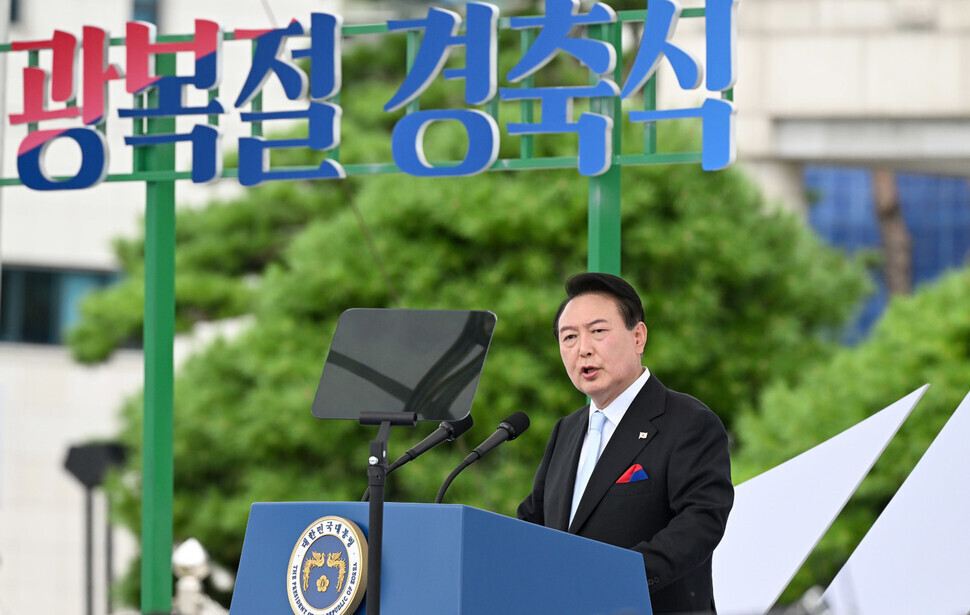hankyoreh
Links to other country sites 다른 나라 사이트 링크
Yoon’s Liberation Day promises to mend ties with Japan, send aid to N. Korea ring hollow

In his celebratory address for Korea’s 77th National Liberation Day on Monday, President Yoon Suk-yeol proposed an “audacious initiative” to Pyongyang that included large-scale food supplies and social infrastructure support, contingent on North Korea halting its nuclear development and pursuing practical denuclearization.
Yoon also called for improvements to South Korea-Japan relations, emphasizing the importance of a “common future” and the “mission of our times.”
But critics argued that Pyongyang’s likelihood of accepting his proposal is low, given that it presupposes a comprehensive agreement on denuclearization, while his approach to resolving issues with Japan lacked specificity in terms of a concrete approach.
In a commemorative ceremony for Liberation Day on the lawn of his presidential office in Seoul’s Yongsan District Monday, Yoon stressed that North Korea’s denuclearization is “essential for sustainable peace on the Korean Peninsula, in Northeast Asia and around the world.”
“The audacious initiative that I envision will significantly improve North Korea's economy and its people's livelihoods in stages if the North ceases the development of its nuclear program and embarks on a genuine and substantive process for denuclearization,” he continued.
He proceeded to share six proposals, including assistance linking food and daily necessities to North Korea’s underground resources, including minerals and rare-earth elements; support for power generation, transmission, and distribution infrastructure; projects to modernize ports and airports for international trade; technological support to enhance agricultural productivity; assistance to modernize hospitals and medical infrastructure; and international investment and financial support initiatives.
The presidential office said it planned to establish an inter-Korean economic development committee if a comprehensive denuclearization agreement is reached, adding that it may discuss partially relaxing UN economic sanctions against the North even without such a prerequisite deal.
But observers said the “audacious initiative” Yoon named Monday as a road map for relations with North Korea bore a striking resemblance to the Lee Myung-bak administration’s “Vision 3000” framework in its emphasis on economic cooperation, which is predicated on denuclearization. Also, they predicted it was unlikely to be well received by Pyongyang, which has recently declared a hard-line approach toward Seoul. The plan did not include any proposals for the security guarantees that Pyongyang is requesting either.
In a briefing, Kim Tae-hyo, the first deputy director of the National Security Office, explained, “A road map has also been developed for cooperation in the areas of politics and the military.”
“In terms of the military, detente measures need to end in a stage of trust building, while in the political realm, measures toward peace need to end in a stage of peace becoming established,” he stressed.
Ahead of his discussion of inter-Korean issues, Yoon mentioned South Korea-Japan issues in his address, signaling his intent to actively improve relations with Tokyo.
Referencing a 1998 joint declaration by then-South Korean President Kim Dae-jung and Japanese Prime Minister Keizo Obuchi, Yoon said, “Today, Japan is our partner as we face common threats that challenge the freedom of global citizens.”
“When Korea-Japan relations move towards a common future and when the mission of our times align, based on our shared universal values, it will also help us solve the historical problems that exist between our two countries,” he continued, stressing his commitment to quickly restoring and developing South Korea-Japan relations.
But he made no mention of the sensitive issues fueling conflict between the two sides, including court rulings ordering compensation to survivors of forced labor mobilization by Japan and the issue of victims of wartime sexual slavery by the Japanese military. The Japanese government has remained unchanged in its view that all of those issues were conclusively resolved with a bilateral claims agreement in 1965.
Yoon also did not make mention in his address of his struggles with low approval ratings for his administration due to problems with appointments and policies or his plans for reforms and cooperation across the aisle.
By Kim Mi-na, staff reporter
Please direct questions or comments to [english@hani.co.kr]

Editorial・opinion
![[Column] Life on our Trisolaris [Column] Life on our Trisolaris](https://flexible.img.hani.co.kr/flexible/normal/500/300/imgdb/original/2024/0505/4817148682278544.jpg) [Column] Life on our Trisolaris
[Column] Life on our Trisolaris![[Editorial] Penalties for airing allegations against Korea’s first lady endanger free press [Editorial] Penalties for airing allegations against Korea’s first lady endanger free press](https://flexible.img.hani.co.kr/flexible/normal/500/300/imgdb/original/2024/0502/1817146398095106.jpg) [Editorial] Penalties for airing allegations against Korea’s first lady endanger free press
[Editorial] Penalties for airing allegations against Korea’s first lady endanger free press- [Editorial] Yoon must halt procurement of SM-3 interceptor missiles
- [Guest essay] Maybe Korea’s rapid population decline is an opportunity, not a crisis
- [Column] Can Yoon steer diplomacy with Russia, China back on track?
- [Column] Season 2 of special prosecutor probe may be coming to Korea soon
- [Column] Park Geun-hye déjà vu in Yoon Suk-yeol
- [Editorial] New weight of N. Korea’s nuclear threats makes dialogue all the more urgent
- [Guest essay] The real reason Korea’s new right wants to dub Rhee a founding father
- [Column] ‘Choson’: Is it time we start referring to N. Korea in its own terms?
Most viewed articles
- 160% of young Koreans see no need to have kids after marriage
- 2[Column] Life on our Trisolaris
- 3[Reporter’s notebook] In Min’s world, she’s the artist — and NewJeans is her art
- 4Hybe-Ador dispute shines light on pervasive issues behind K-pop’s tidy facade
- 5[Editorial] Penalties for airing allegations against Korea’s first lady endanger free press
- 6Presidential office warns of veto in response to opposition passing special counsel probe act
- 7Vietnamese war victims speak of sexual violence by S. Korean troops for the first time
- 8S. Korea discusses participation in defense development with AUKUS alliance
- 9Japan says it’s not pressuring Naver to sell Line, but Korean insiders say otherwise
- 10Months and months of overdue wages are pushing migrant workers in Korea into debt